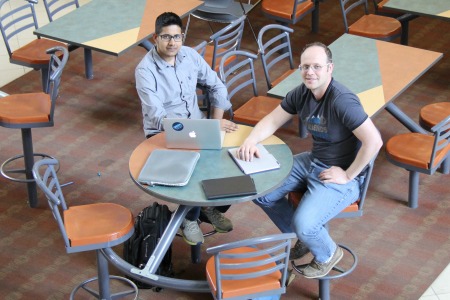
UAlberta materials engineering PhD student Preetam Anbukarasu and MBA student (and materials engineer) Zack Storms have won the $30,000 TEC Venture competition.
(Edmonton) A pair of entrepreneurial graduate students at the University of Alberta have won the $30,000 TEC Venture competition with a plan and technology that will help restauranteurs maintain food safety.
Zack Storms and Preetam Anbukarasu have devised smart sensors that will wirelessly monitor and record temperatures in refrigeration units, improving reliability and safety.
Some large restaurants can have as many as 20 walk-in refrigeration units. Regulations require that three times a day someone has to go into the units, check the temperature and record it on a sheet of paper.
The system is time-consuming and hardly foolproof.
Sensors developed by Storms and Anbukarasu record temperatures and stores the data 24 hours a day-and sends alerts if the temperature in one of the units falls below a set point.
"From a restaurant manager's position this is helpful because you know the work is being done," says Storms. "It gives you a record and you know the monitoring is being done."
So do restaurant inspectors, who review the records.
"It's reliable and it's a simple system-you can install it yourself," said Storms.
It isn't surprising that the two started their own company, Preza Technologies, or that they're focusing on food safety. Both are interested in entrepreneurship and have worked in a research lab run by materials engineering professors Anastasia Elias and Dominic Sauvageau. Their team is developing "smart packaging" that protects consumers from contaminated food.
Storms earned his PhD in materials engineering at McGill and completed a post-doctoral fellowship at the University of Alberta Faculty of Engineering, with the support of funding from Alberta Innovates-Technology Futures aimed at entrepreneurial researchers. He's now working towards his MBA at the U of A's Alberta School of Business.
Anbukarasu, who completes his PhD in materials engineering this year, says a graduate degree can pave the way to running your own start-up.
"I was already thinking of starting a business-and that's why I decided to get a PhD," he says. "If you know exactly what you want, a PhD is a great way to go."
Storms feels the same way.
"I wanted to go all in on technology commercialization and being a scientist-entrepreneur," he said. "That's what I call myself."
The two are investing the $30,000 in prize money from the TEC competition into their company-and they agree that the hours of long work they put into preparing for the competition was worth at least as much as the money itself.
"We spent a lot of time preparing, we did three practice pitches to local investors and got feedback from them," Storms said, adding that comments and questions they'd received from reviews of their business plan guided them to a winning presentation.